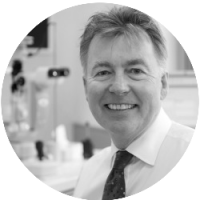Interview transcription
When will I start to see ReLEx SMILE results?
We interviewed Robert Morris to find out when you can expect to see ReLEx SMILE results.
Almost Immediate results.
Robert Morris: ReLEx SMILE is a surgical procedure, and with all surgical procedures, there’s some recovery time. But astonishingly, particularly in patients with a high prescription, there’s an almost immediate improvement in vision. Patients can sit up from the table and having laid down with big, thick, heavy spectacles on; they can often see the time on the clock straightaway. It’s quite an emotive thing for patients. But it’s important to remember that that’s not perfectly clear vision. There’s a mistiness to the vision following SMILE, that can last two to three days. Patients will say, my vision’s nearly there, but it’s almost like I’m looking through some condensation. But I would expect patients whom I treat to be back at work within 48 hours and driving within 48 hours after a ReLEx SMILE procedure.
What patients do notice, however, is, because of the healing time of the cornea, that in low light conditions, particularly for night driving, they’ll notice some starbursts and glare. That will gradually resolve over a two to six week period, but in the initial weeks that can be quite pronounced. It’s simply part of the healing process. Similarly, with all corneal laser procedures, although less so with ReLEx SMILE, the eye may be a little bit dry after surgery. This can last for two to three months, particularly in patients who are heavy computer users. This is because we know that when patients use the computer, they don’t often blink, and the surface of the eye can dry out and blur the vision. So complete recovery will take three months or so, but the initial results can be immediate.
About the Author

Mr Robert Morris
BSc(Hons), MB BS (Hons), MRCP, FRCS, FRCOphth
Consultant Ophthalmic Surgeon
Robert Morris trained at St Bartholomew’s Hospital, part of the University of London, and graduated with Honours in his final examinations. Robert completed his post-graduate ophthalmic training at the renowned units in Oxford Eye Hospital and London’s Moorfields Eye Hospital. Within the NHS, he has performed over 12,000 cataract procedures. He has an interest in squint surgery and is a national expert in this field. In addition to his NHS work, Robert manages a successful independent private practice. He continually updates his training to keep abreast with the latest technology and techniques in refractive surgery.
